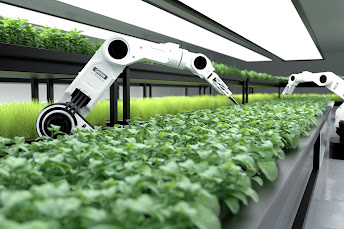From Field to Future: Advancements in Agricultural Technology
In the ever-evolving landscape of agriculture, technological advancements have become the driving force behind increased efficiency, sustainability, and productivity. The intersection of innovation and traditional farming practices has given rise to a new era in agriculture, where cutting-edge technologies are transforming the way we grow, harvest, and manage crops. Here, we delve into the remarkable journey from the field to the future, exploring key advancements in agricultural technology.
Precision Farming: The Digital Revolution:
Precision farming harnesses the power of data-driven decision-making. Through the use of satellite imagery, GPS technology, and sensors, farmers can now analyze their fields with unprecedented accuracy. This data-driven approach enables precise resource management, optimizing the use of water, fertilizers, and pesticides. As a result, farmers can enhance crop yields while minimizing environmental impact.
Autonomous Machinery: Cultivating Efficiency:
The integration of autonomous machinery, including robotic harvesters and drones, is reshaping the agricultural landscape. These smart machines are designed to perform tasks with precision and efficiency, reducing the need for manual labor. Drones equipped with advanced sensors monitor crop health, identify diseases, and even apply targeted treatments. Autonomous tractors navigate fields with optimal efficiency, making farming operations more streamlined and cost-effective.
Biotechnology and Genetic Engineering: Resilient Crops for a Changing Climate:
Advancements in biotechnology and genetic engineering have given rise to genetically modified (GM) crops with enhanced resistance to pests, diseases, and environmental stress. These resilient crops contribute to global food security by ensuring stable yields in the face of climate change and other challenges. Moreover, bioengineered crops are designed to require fewer chemical inputs, promoting sustainable farming practices.
Vertical Farming: Growing Upward for Sustainability:
Vertical farming represents a paradigm shift in agriculture, especially in urban environments with limited space. By stacking crops in vertical layers, controlled indoor environments leverage artificial lighting and hydroponic systems to optimize growing conditions. This not only maximizes space but also reduces the environmental footprint associated with traditional farming methods.In conclusion, the journey from the field to the future in agriculture is marked by innovation, efficiency, and sustainability. These technological advancements not only empower farmers to meet the demands of a growing global population but also contribute to a more resilient and environmentally conscious agricultural sector. The ongoing evolution of agricultural technology holds the promise of a greener, more productive future for the world's farmers and consumers alike.



.jpg)
Comments
Post a Comment